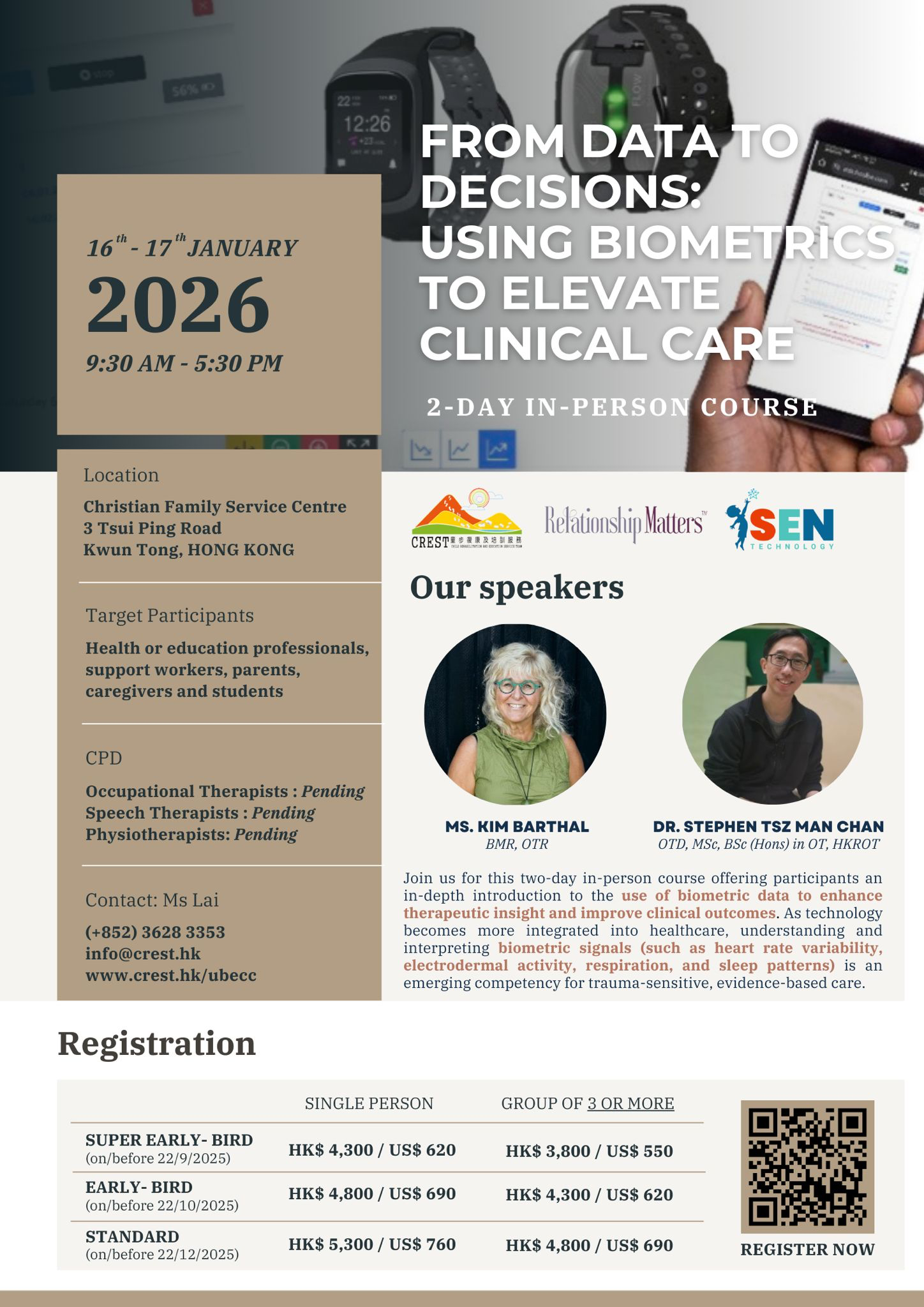COURSE INFORMATION
Join Kim Barthel, OTR and Dr. Stephen Chan for this two-day in-person course offering clinicians, therapists, and allied health professionals an in-depth introduction to the use of biometric data to enhance therapeutic insight and improve clinical outcomes. As technology becomes more integrated into healthcare, understanding and interpreting biometric signals (such as heart rate variability, electrodermal activity, respiration, and sleep patterns) is an emerging competency for trauma-sensitive, evidence-based care.
Participants will explore the science behind autonomic regulation, arousal, sensory processing, and interoception through the lens of biometric data. Emphasis will be placed on real-world application using consumer-grade wearables and digital platforms, ethical considerations, client-centered interpretation, and trauma-sensitive pacing. This course blends physiology, relational neuroscience, and practical clinical decision-making to support deeper understanding and more attuned care. Special attention will be given to the treatment of individuals with neurodiversity, including those with autism spectrum disorder (ASD), attention-deficit/hyperactivity disorder (ADHD), fetal alcohol spectrum disorder (FASD), and sensory processing differences.
Participants will be able to:
Define and interpret key biometric signals including HRV, EDA, respiration, skin temperature, sleep metrics, and movement.
Describe the relationship between biometric data and autonomic states, sensory regulation, and interoceptive awareness.
Assess client readiness for engagement or deeper therapeutic work using biometric indicators of arousal and regulation.
Apply biometric feedback in support of pacing, co-regulation, body awareness, and client empowerment.
Integrate biometric patterns into documentation, clinical reasoning, and interdisciplinary collaboration.
Identify ethical considerations and limitations in the use of wearable and biometric technology in therapy.
INSTRUCTORS
Ms. Kim Barthel (BMR, OTR)
Kim is a world-renowned speaker, teacher, occupational therapist, and author. Kim actively studies and teaches the areas of complex behaviour, neurobiology, sensory-processing, movement, trauma-sensitive practice, attachment theory and mental health.
As a clinician with 41+ years experience in different contexts and cultures, Kim is an Advanced Neuro-Developmental Treatment Instructor as well as a Sensory Integration Instructor. She’s contributed to several textbooks on pediatric OT, NDT and Trauma, and is honoured to be a mentor to many dedicated professionals from a range of interconnected disciplines.
With her extensive technical skills and expertise, Kim is a natural at inspiring and connecting diverse audience members. Her unique blend of skills in utilizing storytelling, humility, science, and her own passion for learning effectively holds and ignites every group of participants she is with.
Dr. Stephen Tsz Man Chan (OTD, MSc, BSc (Hons) in OT, HKROT)
Stephen is an occupational therapist based in Hong Kong and the founder of CREST Child Rehabilitation and Education Service Team. In addition to his clinical work, Stephen teaches professional training courses on various topics such as Ayres Sensory Integration, Beckman Oral Motor Assessment and Intervention, and Irlen® Syndrome. These courses equip professionals with essential skills to support children's development effectively.
Stephen is also the co-founder of Possible Technology and SEN Technology, companies that develop innovative tools utilizing eye trackers and tablet apps to enrich assessment and training in therapy. Embracing technology in clinical practice, he developed the AMUSETM Approach to utilize Electrodermal Activities as physiological measures in clinical and school settings to enhance our understanding of arousal and emotional changes in clients.
Hosted by:
CREST



